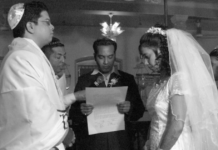
If, as I argued in Chapter 2, diasporic South Asian writers tend to associate Jewishness with the past and to transform Jewish characters into a haunting presence, their representations are inextricably linked with the narration and understanding of Indian Jews in other disciplines like journalism and history. In Edna Fernandes’s The Last Jews of Kerala (2008), for example, the subject community is described as “dwindling” (x), “diminishing” (xi), and its “demise… an inevitability” in the book’s first pages, in keeping with the title (xi). There is little doubt that the size of the Jewish community in Cochin has shrunk, posing several issues. However, as Maina Chawla Singh points out in Being Indian, Being Israeli (2009), “much existing scholarship appears to linger in… a nostalgic mode’—singing a requiem to the story of Indian Jews, as a story that ostensibly ended when they emigrated from India,” and that this narrative can and should be called into question (39). When the purported tolerance India has shown for Jews is cited to refute present charges of discrimination by other Indian minority groups, this nostalgia can have ominous overtones. For example, the-south-asian.com published a special issue on India’s Jews in March 2001.
Source: https://www.link.springer.com/chapter/10.1057%2F9781137339690_5




